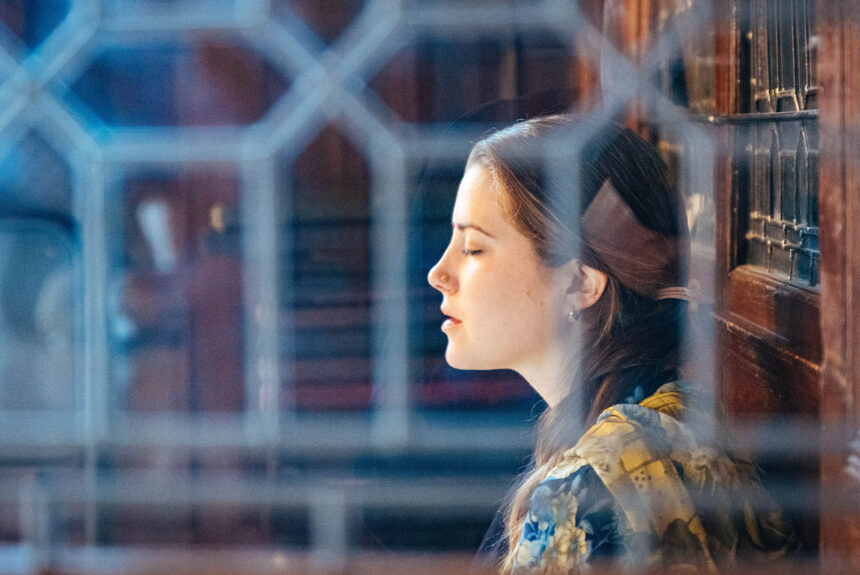By Ananta Gopal Das | Head Pujari (Priest) at Bhaktivedanta Manor
It is 3:30 a.m. when my alarm goes off. I offer obeisances to my spiritual master and go for a shower. At 4 a.m. I perform acaman and apply Tilak to the twelve parts of my body. Thirty minutes before the morning prayers, when the temple is still quiet, I chant sacred Gayatri mantras that were given to me by my spiritual master.
At 4:30 a.m., prayers begin. First, we sing Gurvastakam prayers, which speak about the importance of the spiritual master in one’s life, followed by the worship of Lord Nrsimha, the form of the Lord that protects His devotees.
Next on the schedule is Tulasi puja—worship of the sacred Tulasi plant. The Tulasi plant and Her leaves are very dear to Krishna. Whenever food or water is offered to the Lord, a Tulasi leaf is placed on top of the offering. In the Caitanya Caritamrita we find the following verse:
Caitanya Critamrita Adi Lila 3.104: “Śrī Kṛṣṇa, who is very affectionate toward His devotees, sells Himself to a devotee who offers Him merely a tulasī leaf and a palmful of water.”
After Tulasi worship is complete, devotees begin their japa. Most devotees chant in the temple room, sitting next to the Tulasi plant, while others prefer circumambulating Tulasi.
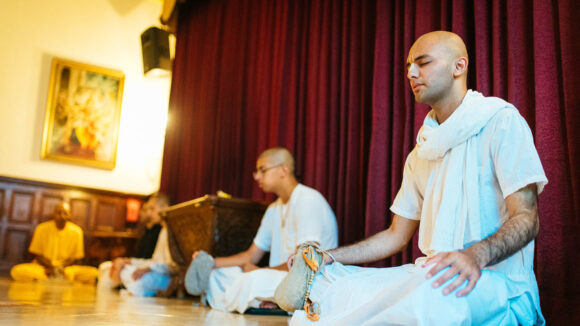
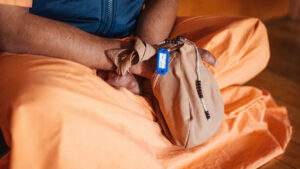
My favourite spot for chanting Japa is in the Srila Prabhupada rooms. For an hour and a half, I chant in the presence of Srila Prabhupada with a few other devotees. Srila Prabhupada often said that he eternally resides in his rooms. Whoever enters those sacred rooms will automatically feel spiritually charged.
After Japa devotees again gather in the temple room for Deity Darshan. For two hours, six pujaris perform elaborate pujas, accompanied by many mantras, mudras, and various other offerings of flowers and food to the presiding deities, Sri Sri Radha Gokulananda.
At exactly 7 a.m. the shrine opens to reveal beautiful deities on a golden throne, garlanded with fragrant fresh flowers, their limbs decorated with jewels and gems of various colours and shapes. Straight after the darshan devotees offer worship to their spiritual master – Srila Prabhupada – followed by ecstatic kirtan, accompanied by dancing and loud singing of Krishna’s holy names.
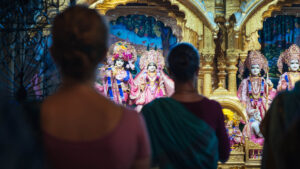
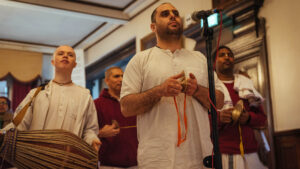
At 7:30 a.m. everyone takes their seat in the temple room to hear Krishna Katha (stories about Lord Krishna) from the book Srimad Bhagavatam. Senior, learned devotees from the community narrate stories about the Lord, quoting various verses from the scriptures. After the talk devotees enthusiastically gather in Sri Krishna Haveli for breakfast prasadam (blessed food).
For the last five decades, Bhaktivedanta Manor has been giving devotees an opportunity to immerse themselves in the spiritual practice by coming together to hear about Krishna, chant His names, and glorify His pastimes, accompanied by wonderful festivals, prasadam distribution, and much more.
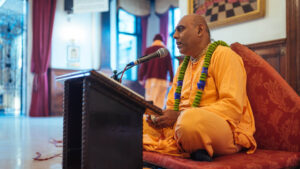
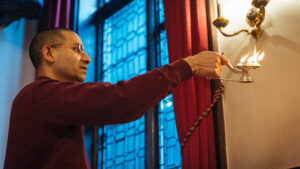
Spare a day in a week, find a free couple of days in a month, or commit yourself for one week in a year when you can come to the morning program at the temple and experience true spiritual happiness in the association of devotees and in the presence of the most beautiful Sri Sri Radha Gokulananda.
Srimad Bhagavatam 7.14.29- Auspicious indeed are the places where there is a temple of the Supreme Personality of Godhead, Kṛṣṇa, in which He is duly worshiped, and also the places where there flow the celebrated sacred rivers mentioned in the Purāṇas, the supplementary Vedic literatures. Anything spiritual done there is certainly very effective.

